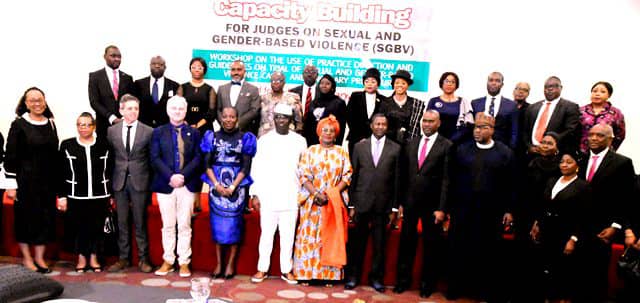The United Nations (UN) Resident and Humanitarian Coordinator, Mathias Schemale, and European Union (EU) Ambassador to Nigeria, Ms. Samuela Isopi on Tuesday said that lack of access to justice and delay in court proceedings are hindering fight against Sexual and Gender-based Violence (SGBV) in Nigeria.
Both of them spoke at a two-day Workshop on the use of Practice Direction and guidelines on the trial of sexual and gender-based violence cases and ancillary procedures, held in Abuja.
Schmale stated ” Access to justice can be looked at from two senses, the obvious being a citizen’s access to courts where they can have their cases tried. But the deeper sense of access to Justice connotes the ability to get redress for the violation of their legal rights.”
According to him, the procedures and mechanism for resolving disputes, and access to justice in a deeper sense also includes other considerations like the physical conditions of the locations where justice is dispensed, the time it takes for the delivery of justice, the affordability in terms of cost of seeking justice, the quality of legal representation.
On his part, the EU Ambassador to Nigeria, Isopi said despite the n UK numerous cases of SGBV only 0.9 percent of perpetrators are brought to justice, and almost hardly anyone gets convicted.
Isopi added that the best way to get justice is to fast-track access to it and also commended the Ministry of Justice for establishing additional GBV courts in Adamawa, Anambra, Edo, and FCT and for organizing the workshop.
The Attorney General of the Federation (AGF) and Minister of Justice, Abubakar Malami, SAN in his keynote address pledges the continued supports of the government to improve the capacity of judges for timely dispensation of SGBV cases.
Malami said, “the Federal Government will continue to seek ways to support the Judiciary in developing its capacities, particularly to invest in technologies that are necessary to automate vital aspects of court operations and implement a digital justice delivery system.
“The expectations are that the judiciary must innovate and grow with the times. Part of this expected innovation entails imbibing dynamism in the application and adjudication of our laws and cases.”
Meanwhile, Dame Pauline Tallen, Minister of Women Affairs in her goodwill message begs judges for efficient and timely dispensation of SGBV cases.
Tallen explained that available statistics show that in Nigeria 30 percent of girls and women aged between 15 and 49 are reported to have experienced sexual abuse.
But said,” Unfortunately, some of the major concerns reported by victims are lack of survivor-sensitive approaches in court procedures, challenges in court proceedings, and delay in all stages of proceedings.
“We are told that these challenges stem from having limited number of courts compared to the large volume of cases, geographical distance to nearest court, language used in courts, most women who are uneducated are unfamiliar with laws that protect their rights, raising cases of secondary victimization, culture of impunity amongst others.”
